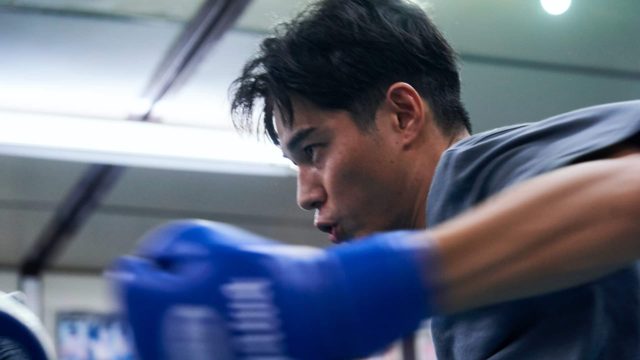
Ogawa Kazuki (Higashide Masahiro) is on a difficult path in Keisuke Yoshida’s Blue
BLUE (Keisuke Yoshida, 2021)
IFC Center
323 Sixth Ave. at West Third St.
Opens Friday, March 11
www.ifccenter.com
www.ifccenter.com
Several decades ago, when my now-wife and I were visiting her paternal grandfather in Florida, he challenged us while watching the Friday night fights. Grandpa Joe said, “We’re betting a nickel a match, and I’m taking the red corner. The red corner always wins.” He opened up a drawer to reveal dozens and dozens of nickels. He looked at his granddaughter and said, “I won these off your father and brothers. Now it’s your turn.”
In Keisuke Yoshida’s poignant boxing film, Blue, the title refers not only to the corner of the ring — the favored team of fighters gets the red side — but to the emotional and physical state of the competitors and their loved ones. This is not a Japanese Rocky story but a powerful gut punch, one the sport can deliver on and off the canvas.
Tired of being bullied, nerdy Narazaki Tsuyoshi (Emoto Tokio) goes to a boxing gym, telling trainer Urita Nobuto (Matsuyama Kenichi), “I’m not aiming to be a boxer. I just want to be perceived as one.” Narazaki, who is the sole caregiver for his elderly grandmother, also wants to impress the fellow pachinko parlor employee (Ayuri Yoshinaga) he has a crush on. Some of the other boxers make fun of him when he displays his flicker jab, which he learned from the boxing manga Hajime no Ippo. He is then challenged by the punk-haired Doguchi (Shinichirô Matsuura), who shows him no respect.
Urita, a kindhearted soul who has a terrible fight record, getting battered and beaten match after match, takes Narazaki under his wing, and soon Narazaki starts showing signs of promise. Meanwhile, the student at the gym with the best chance of becoming Japanese champion, Ogawa Kazuki (Higashide Masahiro), is having brain issues, forgetting what he’s doing, occasionally feeling lost in the world. Ignoring doctor’s orders — and the wishes of his fiancée, Chika (Fumino Kimura) — Ogawa keeps on training and fighting as things get worse. As the tournament approaches, everyone has unique obstacles to face as they look to futures that are far from certain.
Last winter, as part of the ACA Cinema Project, Japan Society and Japan’s Agency for Cultural Affairs teamed up for “21st Century Japan: Films from 2001-2020,” a three-week virtual festival of Japanese films from the last twenty years, followed in December by “Flash Forward: Debut Works and Recent Films by Notable Japanese Directors,” a three-week hybrid series pairing directors’ most recent works with their debuts. Now the ACA Cinema Project is presenting the US theatrical premiere of Blue, which opens March 11 at IFC Center, along with Yujiro Harumoto’s award-winning A Balance.
Blue reunites Matsuyama, Higashide, and Kimura from Yoshitaka Mori’s award-winning 2016 drama, Satoshi: A Move for Tomorrow, about professional shogi player Satoshi Murayama. Blue is set in a very different sport, inspired by writer-director Yoshida’s three decades of boxing experience. First and foremost, he gets the boxing right; the scenes in the ring are terrifically photographed with handheld cameras, putting the viewer in the midst of the action. Yoshida (Raw Summer, Café Isobe) also avoids the stereotypes of the genre with well-developed characters and unexpected plot twists that feel realistic and believable.
The young cast is a winning team with instant chemistry, led by Kimura’s charm and Kenichi’s stellar portrayal of the complex Urita. As good as the boxing scenes are, Blue is about so much more. “Don’t you feel frustrated?” Narazaki asks Urita after the latter loses again. “Yes, I’m frustrated,” the Zen-like Urita responds thoughtfully. “I’m frustrated, but if you could transform frustration into strength. . . .”
It’s a feeling we each know all too well, and not just when we lose yet more nickels to Grandpa Joe.